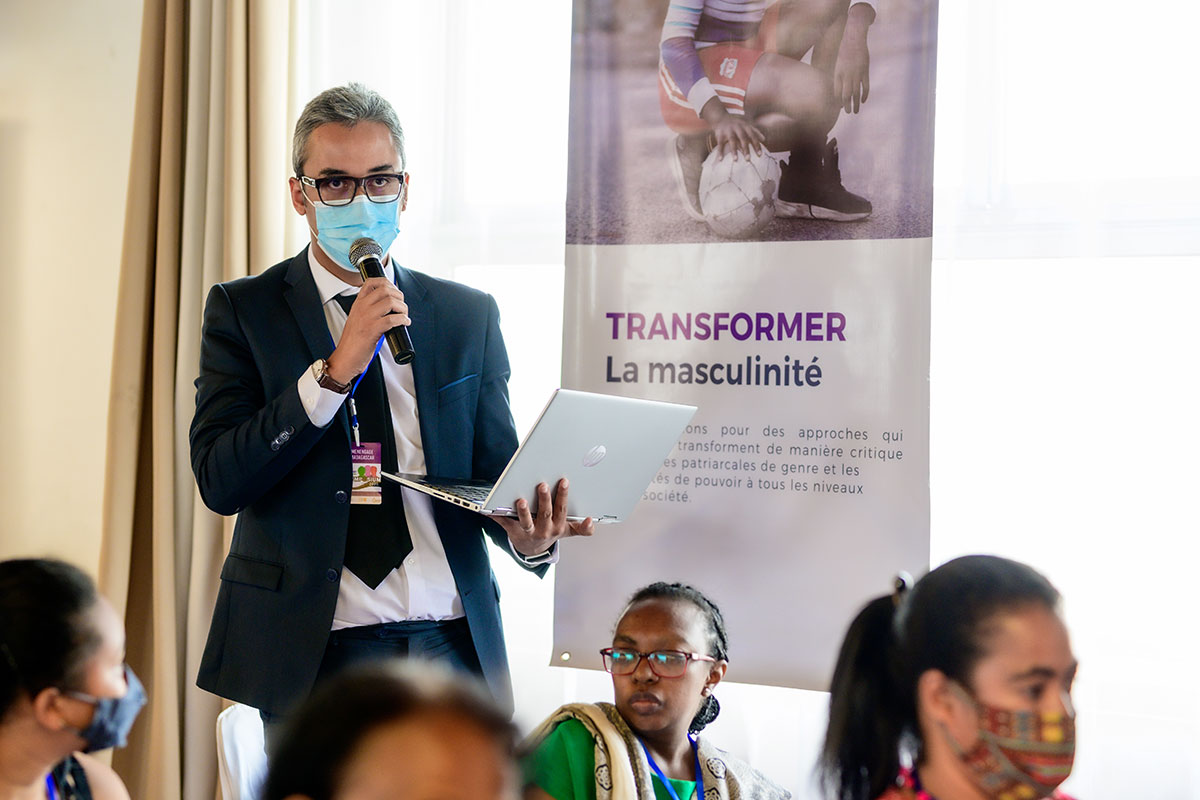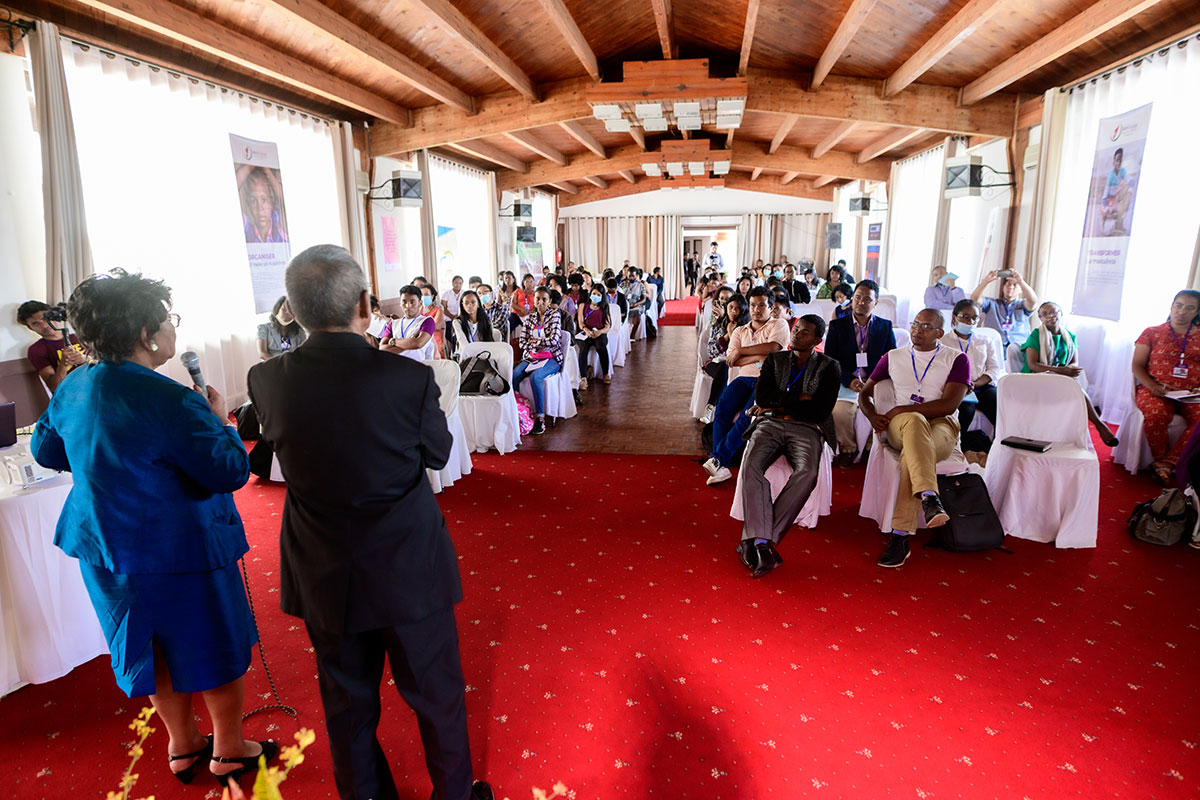
Today, more than ever, gender-based violence is at the heart of many debates around the world. Pro-feminist actions have woken up and are now affirming their commitment to the struggle for gender equality.
With this in mind, MenEngage Madagascar held its first Symposium on December 04, 2020 at Panorama Andrainarivo, Antananarivo. The Symposium highlighted the joint work of network members and key partners under the theme “Men and Boys for Gender Equality”.

The main objective of the meeting was to promote the importance of the involvement of men and boys in order to reduce legal inequalities between men and women. About 103 specialists in various fields of the law met to discuss and raise issues related to social norms of gender and masculinity in Madagascar, but also to create public awareness on the need for the involvement of men and boys in order to recognise the place of women in society, and finally to strengthen and expand the MenEngage Madagascar network.
Among those present were people from associations and NGOs working for the protection of children, the protection and promotion of women, the protection and promotion of key populations, the protection of the environment, as well as representatives of the United Nations, including UNIICEF and UNFPA.

To highlight the need for the involvement and commitment of men and boys for gender equality, different speakers at the Symposium addressed five key themes, with the aim to facilitate the achievement of gender equality outcomes:
- Involvement of men in changing policies that perpetuate gender inequalities: Hanta ANDRIANASY from FES (Friedrich-Ebert-Stiftung) spoke of the importance of involving men in this change and of making it possible to reduce inequalities between women and men by respecting the roles of policies that “ensure the harmony of living together, responding to the diversity of the population’s needs and interests, taking into account the plural values to which the different categories of the population are attached”.
- Men’s Involvement in sexual and reproductive health: Eugene ANDRIAMASY from Marie Stopes International demonstrated the change that can result from men’s involvement in the sexual and reproductive health of their spouses. Indeed, he supports the idea that “men’s involvement in sexual and reproductive health should begin as early as adolescence. He pointed out that first sexual intercourse often happens early, and it involves both sexes, thus boys should also be informed to prevent the risk of sexually transmitted infections and unwanted pregnancies. He added that this involvement should continue into adulthood. He said men must approach contraception in a positive way, respect the choice of both partners to have children by choice, help in decision making, and even offer to take responsibility because the man too can use modern methods of contraception”.
- Involving men in maternal and child health: Rossella ALBERTINI from UNICEF(United Nations Children’s Fund) explained that in order to achieve the involvement of men in maternal and child health, it is “imperative to build and strengthen a vision of masculinity in which men are stakeholders in the well-being of the whole family. This approach involves different levels: institutions, services, communities, peers. It requires that actions at the upstream level of service reform and collaboration with institutions to improve public policies meet downstream actions where communities are committed to a common vision of results to be achieved to maximise the well-being of all groups, regardless of age and gender. It also involves a discussion of customs and traditions around maternal and child health, not to erase them but to identify those that are beneficial and should be valued and those that risk compromising the present and future health of mothers and children. Furthermore, it requires the de-stigmatisation of certain intrafamilial attitudes (for example, if a man is not authoritarian, he is not considered a man) in favour of a perception of the enormous gain that can be made with a different masculinity: for women and children, but for men as well”.
- Involvement of men in the fight against gender-based violence : Sariaka NANTENAINA from C-FOR-C (Capacity Building for Communities), spoke about the facts around this phenomenon of violence, and demonstrated the importance of men’s involvement in the fight against gender-based violence. She addressed the need to raise awareness among men, the need for men to take part in the fight against gender-based violence, for men to realise that the quest for equality is not only a woman’s affair. She said, “Violence against women is primarily a man’s and boy’s problem’’, saying ‘’the problem is that we identify violence against women as women’s problems to be solved by women and girls. When we also try to discuss the problem with men and boys, they immediately slip away and say that as men it doesn’t concern them. It’s exactly the same problem when we talk about gender. When we hear the word gender, we immediately tend to think ‘woman’. So we think that the gender problem is a female problem, that gender-based violence means violence against women, while this is not the case”.
- Involvement of traditional and religious leaders for the promotion of gender: Charles ANDRIAMASINORO from Simiralenta spoke about the importance of leaders taking responsibility in our living environments, because “leaders use speech as an instrument of power for decision-makers in order to establish their authority’’. He said, ‘’the technology well mastered by young people is forcing us to review the situation and the system of hierarchy and speech, given that competitiveness looks set to be tough in the current development context. A communication for a change in behaviour is then necessary, given that the evolution towards equality between men and women is palpable, though insufficient, and that today’s youth aspire to a better, equitable future”.

